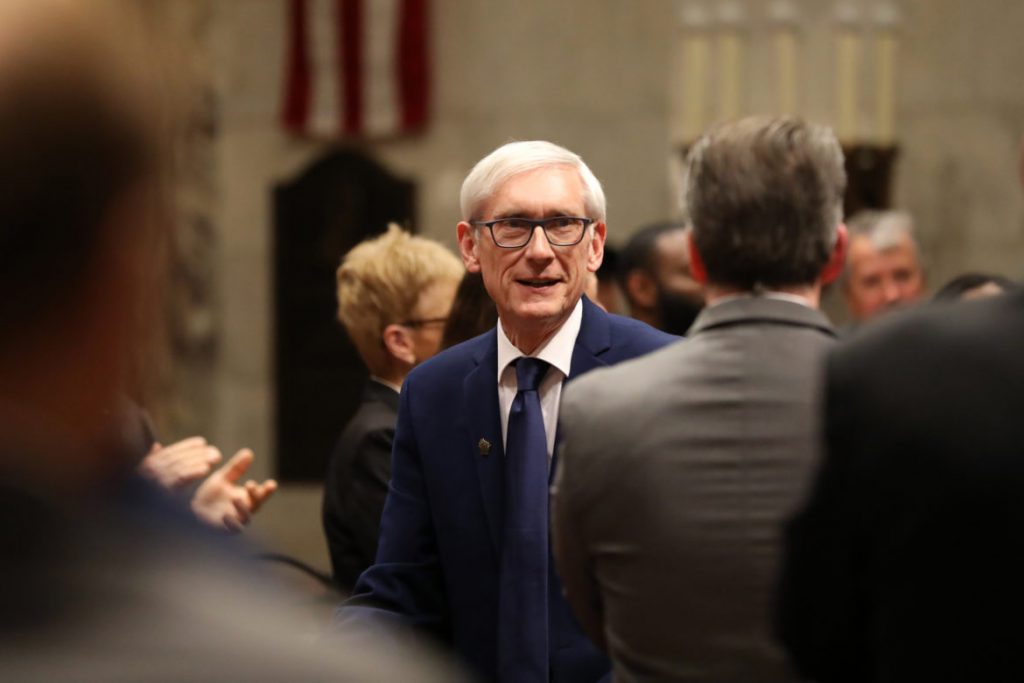Evers Shifts $170 Million, Extends Child Care Support
Using federal reimbursement for FEMA expenses to extend child care funding into 2025.
Gov. Tony Evers announced Monday his administration would shift $170 million toward Wisconsin child care providers as stopgap funding to stave off a potential fiscal cliff early next year and extend state support for providers into 2025.
Evers made the announcement as a state Senate committee voted to eliminate more than twice that amount in child care support from a bill that the governor proposed in August.
Evers said his action Monday “isn’t a permanent solution to the looming child care crisis facing our state” but an emergency measure. “We have billions of dollars readily available to make real, meaningful investments to finally address the pressing issues facing our state,” Evers said.
Earlier Monday, his administration announced that Wisconsin’s projected surplus for the 2023 fiscal year ending June 30 had climbed to $7 billion from $4.4 billion.
The new funding will extend support for providers under the state’s Child Care Counts program that was launched during the COVID-19 pandemic. Through May of this year, Child Care Counts paid out a total of about $20 million a month, split among child care providers around the state, to supplement their income from parent fees.
Providers and child care advocates credited Child Care Counts with enabling providers to raise the wages of child care workers without hiking fees. Starting in June, the program was cut to $10 million a month to stretch the funds out longer, but until Monday, it was expected to end entirely in January.
The governor’s office said the money would make it possible to continue the stabilization program “at current levels through June 2025.”
While forestalling the end of the program for more than a year, the reduction this past June has led some providers to close and others to raise their fees. It has also prevented providers from expanding their staff, according to child care advocates.
“This is a much-needed investment into our child care programs to keep us going and a reprieve for parents bracing for significant increases in January,” said Corrine Hendrickson, a New Glarus family child care provider and cofounder of WECAN, Wisconsin Early Childhood Action Needed, an advocacy group for providers and parents.
“However, we absolutely still need the other half to bring us back up to May levels to continue to increase wages to start becoming competitive with other jobs and reopen rooms still sitting empty, so more families who want child care can access it and fill the job openings throughout the state,” Hendrickson said.
“We know early childhood programs and educators will breathe a small sigh of relief as they take in this news, as it represents critical support while they grappled with raising parent fees and possibly closing their doors in anticipation of the end of the [Child Care Counts] program,” said Ruth Schmidt, executive director of the Wisconsin Early Childhood Association.
“It is also important to note the early childhood field has, for a long time, needed long-term investment,” Schmidt said. “Child care needs to be recognized by state Legislators for the vital public good it is.”
The surprise infusion was made possible by reimbursements that the state received from the Federal Emergency Management Agency (FEMA) for expenses that Wisconsin incurred in responding to the pandemic, the governor’s office said, along with the “underspending of funds previously allocated for pandemic response needs.”
Evers announced the infusion Monday hours after the state Senate Committee on Economic Development and Technical Colleges voted along party lines for a Republican amendment to the governor’s August proposal for $1 billion in workforce-related programs, including $365 million in child care support.
The amendment replaced Evers’ proposals in the legislation with a proposal to cut the state’s third-highest tax rate to 4.4% from 5.3% and with other measures that were not part of the governor’s bill. A Legislative Fiscal Bureau memo says the proposed tax cut would reduce state revenue by about $2 billion over the course of Wisconsin’s 2023-25 budget.
As amended, the bill itself passed the committee on a party-line vote. It has been scheduled for the state Senate’s floor session Tuesday.
“I hear nearly every day from small businesses, farmers and producers, school districts, and hospitals and healthcare sectors, among other key industries, who face significant challenges finding workers to fill available jobs—challenges that we know will only be exacerbated by the looming child care crisis facing our state,” Evers said. “So, it’s unconscionable that, even as Wisconsin has the highest surplus in state history, Republicans won’t pass my comprehensive workforce plan to address our state’s generational workforce challenges and prevent the collapse of our state’s child care industry.”
Evers moves $170M to extend child care support into 2025 was originally published by the Wisconsin Examiner.






















